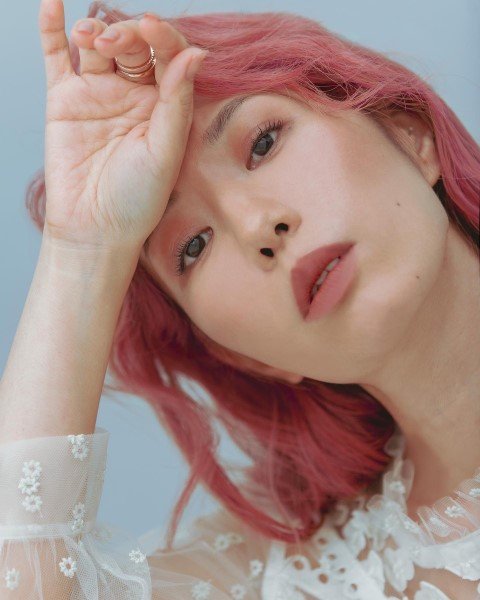Worth the Wait - Interview with Lil Leise But Gold
Born in Tokyo, Lil Leise But Gold is an alternative R&B artist and singer/songwriter who released her first album 喧騒幻想 (kenso genso) at the end of 2022. She also happens to be married to super producer KM. In this exclusive interview, Royce Leong of Tokyo ON inquires about her musical background and her relationship with KM, and explores the meaning and emotions behind 喧騒幻想.
Photo by Miyu Terasawa
<Artist journey>
Tokyo ON: How did you come up with the name Lil Leise But Gold?
Lil Leise But Gold: It was decided by my producer KM, who is also my husband.
It’s a made up phrase consisting of “Lil”, which is short for little, and “Leise”, which is German for small, and by adding “But Gold”, it becomes “Small but truly valuable”. “Small” doesn’t refer to my voice, rather it refers to my presence, so the image is “My presence may be small in this world, but I am worth a lot”.
TO: What was your childhood like? How did you end up becoming a musician?
LLBG: I started learning classic piano when I was 3 years old, and continued until I was 15. In junior high school, I played the flute, so in my upbringing and life, I’ve been in an environment with music like it was totally natural. I started singing when I was 17, and here we are.
TO: What kind of music influenced you?
LLBG: When I was young, I listened to classical music, and when I was a teenager my friends taught me about hip-hop and R&B. In my 20’s I listened to a wide range of genres from jazz to reggae music, and I think all of that is ingrained within me. As for artists, I’ve got lots of artists I like, but if I had to pick one I think it would be Sade.
TO: Do you find that your classical music background helps you write songs?
LLBG: Definitely. Classical melodies are the base of my music.
TO: How did you meet KM? Was it a magical encounter? Or a natural development?
LLBG: I met KM in a club in Nishi-Azabu in Tokyo. I just happened to be invited by a friend to go clubbing and he was DJing there. I love Grover Washington Jr.’s “Just the Two of Us”, and I’d been searching for and listening to lots of different remixes of the song. On that night, KM played a version of “Just the Two of Us” that I’d never heard before, and I really wanted to know what it was, so I asked him, and that’s how it all started. After that, we just naturally got together.
TO: The lyrics of Just the Two of Us fit the scene so well! “And darling when the morning comes, and I see the morning sun, I want to be the one with you”. Looking back, do you see that as a really special moment?
LLBG: Yes, that was a very special moment. Thinking that you want to be together with someone when the morning comes, and the morning after and the next, it’s a very beautiful and warm feeling.
TO: Do you consider yourself a romantic person?
LLBG: Very much so.
TO: When you had a child, you decided to focus on being a mother and put your music career on hold. At the time did you think that was fair? How did you feel about it?
LLBG: I didn’t think it was unfair, but I felt this kind of loneliness, a “disconnection from society” that I had never felt before. The time you spend with your children is meant to be a really happy time that’s totally irreplaceable, but I had these feelings of loneliness and impatience in my heart, and I really wanted to do music stuff, so I felt unworthy of being a typical "good mother" and I suffered.
TO: Did you find it hard to return to music?
LLBG: The music activities that I had been doing up until I got pregnant were impossible to keep up as is, but after I had kids, I restarted my music with my husband as a means of relieving my distress, so taking that first step wasn’t so difficult.
TO: Parenting must be a challenge since you are both musicians and normally active very late at night. How do you handle it?
LLBG: When I have a solo performance, or the two of us perform at night, we get our parents to cover for us.
TO: Are you still having fun in the club? Or has it become more like a job?
LLBG: Up all night in the club, partying day or night, I enjoy it so much, to me it’s like water for a fish.
TO: Leading up to Kenso Genso, you released one or two singles a year. Is that your normal production pace or could you make many more songs if you had more time and space?
LLBG: For my own releases that was my pace, but it’s also because I’ve been providing lyrics for other artists. Sometimes I think I wish I had more time to use for myself, but since I’m raising kids, it’s hard to focus for long periods of time, so it’s still difficult.
TO: Most of your songs are produced by KM, but because he is proficient at many genres it’s not limiting at all. Still, is there something you want to try musically outside of this partnership?
LLBG: That’s true, KM has a really deep knowledge of music, so I think he can pull off any genre. So for the time being I’d like to try lots of different styles and genres of music together with him.
TO: Recently you did a collab for the web3 collective Senspace (appearing as Little Drip), are you open to working with overseas producers and artists?
LLBG: Sure. It’s a wonderful thing to respect and sympathise with one another through music. There might be some interesting chemistry.
TO: When you create songs, does KM generally give you a beat and you do the top line and lyrics, or do you provide direction on what kind of sound you want?
LLBG: Generally KM gives me a beat and I think of the top line and lyrics. In many cases, once I've got everything sorted out, I ask KM to listen to the whole thing and make adjustments.
TO: Is there any time when you are hearing KM working on something for someone else and you say “I want that beat”? Do you get any perks living together?
LLBG: That happens all the time. The music he makes is really unique, and has an appeal that no one else has, so there are many times when I get jealous of the people who get to sing over his beats. As a benefit of living together, I can have immediate discussions on the music making process on a daily basis and understand the nuances that go beyond words.
<About 喧騒幻想 (kenso genso)>
TO: Kenso Genso uses a lot of compound kanji, it’s hard for non Japanese people to understand! Firstly, tell us about the concept of Kenso Genso.
LLBG: In this case, kenso means noise, and it refers to both real things like the hustle and bustle of the city, as well as spiritual noise. 喧騒幻想 is a word combination I came up with to mean that both good noise and bad noise for me are like a momentary "illusion" or genso.
TO: Kenso Genso is full of contrasts, the real and the imagined, the physical and intangible, what is remembered and forgotten, knowing and confusion. It feels like shifting between states, that what you see before you depends on your perspective. From the lyrics of Kenso Genso, how do you perceive the world?
LLBG: Indeed, in everything there is light and dark, and it changes depending on how you perceive and the angle which you see it. That’s why I try to be conscious of looking at things from multiple angles as much as possible to avoid getting trapped by a single interpretation, I’ve always got my antenna up. That applies from personal matters (myself and others) to the state of the world.
TO: Another key compound kanji is 諸行無常 (shogyo mujo), which is a Buddhist concept. In a way, everything changes, nothing stays the same. How do you interpret that phrase?
LLBG: Living in Japan, we exist together not only with Buddhism but also millions of gods, our ancestors, and many spirits, and various religious concepts are mixed up inside me as a result. 諸行無常 is one of those concepts, and I think of it as a quiet observation as “is what it is, a state of change”. It is an interpretation that accepts things that do not change, things that do change, things that have been chosen, and things that have not been chosen.
TO: I feel like one of the main themes of this album is memories, for example “美しいすぎるメモリーズ” (I love you), “あの日を忘れないYou&I” and of course the chorus of “Remind You”. What memories are important to you, why do you need to remind yourself or others of the past?
LLBG: Those momentary sparkles that I spoke of, they become more beautiful with time, and you can polish them up further. It’s possible that they can appear more dazzling than the reality. Sometimes it becomes a seed for the future, and sometimes it becomes an obsession with the past. But my life is the result of each and every single choice I’ve made, so I put it in the lyrics with a flat feeling.
TO: Do you feel a longing for the past? Even though you can’t go back?
LLBG: I don’t think I want to go back, but I do feel a longing for the past. At the same time, when I do feel that, I think that who I am today is mentally tougher and more beautiful than who I was in the past, so it makes me want to embrace my past self.
Photos by Momoko Umezaki
TO: The other theme I sense is escape. “Let’s go 今から paradise” (One), “Come with me forever” (Dance With Me), the image of a star ship leaving the Earth, going to the beach in Summertime Blue. Do you have some dissatisfaction with reality?
LLBG: Personally I don’t have any dissatisfaction with reality. But it’s different to satisfaction, it’s more like acceptance. However, in music and poetry, it's a free space for me, where I can be anywhere and anything, so I enjoy it. Rather than an escape, it is an existence that liberates me.
TO: You mention that love is difficult, romance is complicated like Bombay & Sapphire. What are some of the issues you come across in your relationship?
LLBG: Through self-analysis I think I’m not suited to romance, I’m careful not to be too obsessed with love.
TO: You express a very strong love in these songs, but at the same time, none of the songs are purely bright or happy like pop music. There’s a darkness, a melancholy to it. Do you believe a truly happy, positive love is possible in this day and age?
LLBG: I’d like to believe so, but human feelings are very complex. In a way, it’s difficult for me to get hold of a “truly happy, positive love”, so maybe it’s something I “hope” for instead.
TO: When you sing “ああ今だけは永遠だ”, the moment, however wonderful, only lasts forever in an instant. Do you think it’s sustainable to keep chasing these moments?
LLBG: If a momentary sparkle stays in my heart, I think it will last forever. I’d like to be able to keep discovering those ああ、今だけは永遠だ moments.
TO: The image of 「二人きりStar ship漂うの冷たい星空飛ぶ」 is very striking, it’s like being in a relationship is something very beautiful yet frightening and even isolating. What were your feelings behind that?
LLBG: I’m still searching for a form of love, and I think this lyric came out of the feeling that I am in the middle of a journey to find it. Even within the category of love, the form of love is very complicated, such as love with swirling desires, pure love, pure but aggressive love, God-like love, and fear that love turns into obsession.
TO: Kenso Genso is a very diverse album, the styles can fit different party scenes like a summer beach house, a rooftop party, an underground club, or a lounge. Do you intentionally think of how your music might be used and received by listeners on the floor?
LLBG: I’m a type of person who’s driven by inspiration (intuition), so I don’t think about it so much, but instead KM thinks about that for me through the melody and production.
TO: In terms of rhythm, some of the music is challenging to sing over! I am impressed with your ability to adapt, in particular on Remind You, that’s basically drum and bass but you managed to create an interesting phrasing in the chorus. Is it difficult for you?
LLBG: The melody and lyrics for Remind You took about two days to make, so it was completed smoothly. I worry a lot when I make lyrics for other people, but my spirit is free when I make my own lyrics, so it means the process is relatively smoother.
TO: I love BPMF, it has such a fun hook to sing along to. Is there a story behind that? Did someone try to approach you during a live or DJ performance that made you angry?
LLBG: I’ve often seen DJs and venue owners rage when people come up to the DJ booth and stop the music or spill drinks on the records and equipment while attempting to do a toast. There are also venues where written warnings like “DO NOT TOAST IN THE DJ BOOTH” and “IF YOU TOAST HERE I’M GONNA KILL YOU” are stuck in the booth, so I suspect that it happens a lot to DJs and clubs. When I detect such an atmosphere, I have a way to dodge it, so it never happens.
TO: Is the trick to say ”B*tch please, I don’t know who you are motherf**ker”?
LLBG: I’ve never actually said it, but I’ve thought it many many times (laughs).
TO: I think BPMF would look great on a T-shirt or cap. Any chance we can get BPMF goods?
LLBG: Definitely! It’d be hilarious to have the lyrics written on the back as well.
TO: Looking forward to wearing a BPMF T-shirt (or yelling it at people) when I DJ in the future. Thanks for your time!
LLBG: Thanks for talking to me!
Check out Lil Leise But Gold’s album Kenso Genso on Spotify, and follow Lil Leise But Gold on Instagram and Twitter.
Profile: Born in Tokyo, Lil Leise But Gold is an alternative R&B artist and singer/songwriter. Her partner in both public and private is producer KM, and she currently has two children. Lil Leise But Gold was raised in a musical environment since she was a child, and although she was familiar with singing, such as performing solo at school musicals, she only became focused on music when she met KM as a DJ. She released her first single “(no) Reason” as an artist in 2019, which marked the start of her music activities. In May 2020, during the pandemic she released the single “Aenaiya”, and in February 2021 the EP “Sleepless 364”, both on add some labels. She featured on KM’s album EVERYTHING INSIDE released in June 2021, and at "KM EVERYTHING INSIDE LIVE" held at WWW X, the venue was captivated with a spectacular performance even though it was their first live performance. Recently she has been expanding her activities, including featuring in the A-Team’s Fables project on the label Frank Renaissance, which connects Japanese and American culture, and on Chicago resident Sen Morimoto’s remix album. In December 2022, Lil Leise But Gold released her first album 喧騒幻想 (kenso genso).



